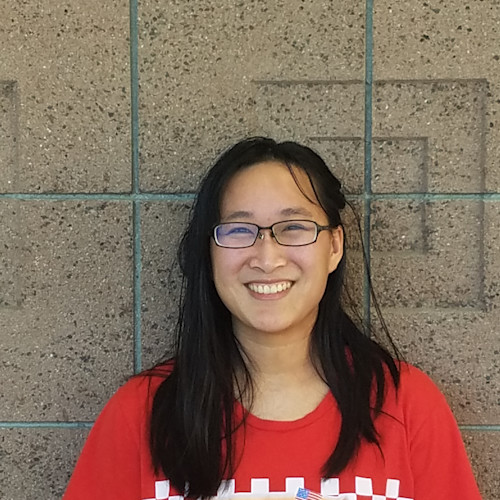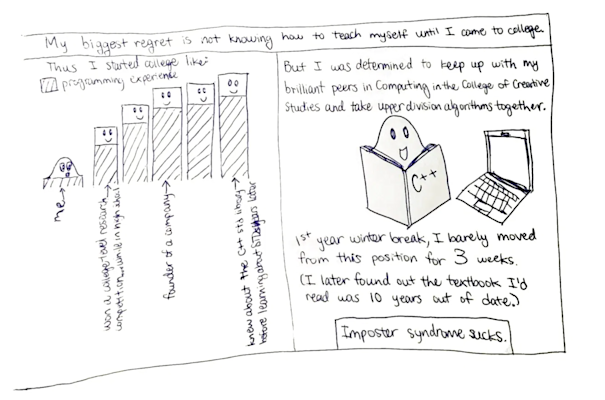Lia Yeh, 21

Lia attended her first hackathon at Tino Local Hack Day in 2014 while in high school. It was there that she noticed that she was the only girl from her high school in attendance which terrified her. She continued to see a lack of women in her 250+ hours of class and ~500 hours of lab research at her university. This feeling that had once been fear turned into determination to bring more women into the field.
During her time at UC Santa Barbara, Lia made active strides to make computer science a more gender-inclusive place. She worked to educate her local community by teaching workshops to middle school and high school girls. This is where she met Sarina Abrishamcar, another volunteer, who shared her feelings of intimidation when it came to attending hackathons. Together, they decided to start a hackathon for women called WomxnHacks. It was then that she felt she truly joined the hacker community.
WomxnHacks aims to create a welcoming place for female-identifying and non-gender conforming college students. Lia emphasizes that when they started WomxnHacks, “it was the first time I got to hear a female software engineer share her story, organize two technical workshops run by queer students, and see around 200 female-identifying and non-gender-conforming college students coding in the same room.” They work to make the content beginner-friendly as they are aware that the male majority intimidates many into entering the field.
Having spent much of her time in a male-dominated environment, Lia was on the receiving end of many odd looks when she said she wanted to be a quantum computer scientist. While familiar with such scrutiny, she channeled her frustrations into a comic which she shared out on her UC Santa Barbara Undergraduate Research blog. It is through WomxnHacks that she feels most empowered and gets to raise up those around her. At WomxnHacks 2020, she will be running a Qiskit workshop which will also prepare her for the 2-unit full-stack quantum computation seminar she will be leading in the Spring.
Her favorite project comes from when she attended AthenaHacks 2019 and worked on a Ruby on Rails app. The app helps friends keep track of their and others’ blood alcohol content. This project is meaningful to Lia because it is a relevant topic for all college students to consider as college partying continues to be a problem seen on many campuses. While this project challenged her in various ways, it ended up winning the best Ruby on Rails hack. This was humbling to receive as she appreciated how hard her team worked to put together a project in such a short turnaround time, despite still having tons of bugs with the actual hack.
Quick Facts

Lia Yeh, 21

Lia attended her first hackathon at Tino Local Hack Day in 2014 while in high school. It was there that she noticed that she was the only girl from her high school in attendance which terrified her. She continued to see a lack of women in her 250+ hours of class and ~500 hours of lab research at her university. This feeling that had once been fear turned into determination to bring more women into the field.
During her time at UC Santa Barbara, Lia made active strides to make computer science a more gender-inclusive place. She worked to educate her local community by teaching workshops to middle school and high school girls. This is where she met Sarina Abrishamcar, another volunteer, who shared her feelings of intimidation when it came to attending hackathons. Together, they decided to start a hackathon for women called WomxnHacks. It was then that she felt she truly joined the hacker community.
WomxnHacks aims to create a welcoming place for female-identifying and non-gender conforming college students. Lia emphasizes that when they started WomxnHacks, “it was the first time I got to hear a female software engineer share her story, organize two technical workshops run by queer students, and see around 200 female-identifying and non-gender-conforming college students coding in the same room.” They work to make the content beginner-friendly as they are aware that the male majority intimidates many into entering the field.
Having spent much of her time in a male-dominated environment, Lia was on the receiving end of many odd looks when she said she wanted to be a quantum computer scientist. While familiar with such scrutiny, she channeled her frustrations into a comic which she shared out on her UC Santa Barbara Undergraduate Research blog. It is through WomxnHacks that she feels most empowered and gets to raise up those around her. At WomxnHacks 2020, she will be running a Qiskit workshop which will also prepare her for the 2-unit full-stack quantum computation seminar she will be leading in the Spring.
Her favorite project comes from when she attended AthenaHacks 2019 and worked on a Ruby on Rails app. The app helps friends keep track of their and others’ blood alcohol content. This project is meaningful to Lia because it is a relevant topic for all college students to consider as college partying continues to be a problem seen on many campuses. While this project challenged her in various ways, it ended up winning the best Ruby on Rails hack. This was humbling to receive as she appreciated how hard her team worked to put together a project in such a short turnaround time, despite still having tons of bugs with the actual hack.
Quick Facts




